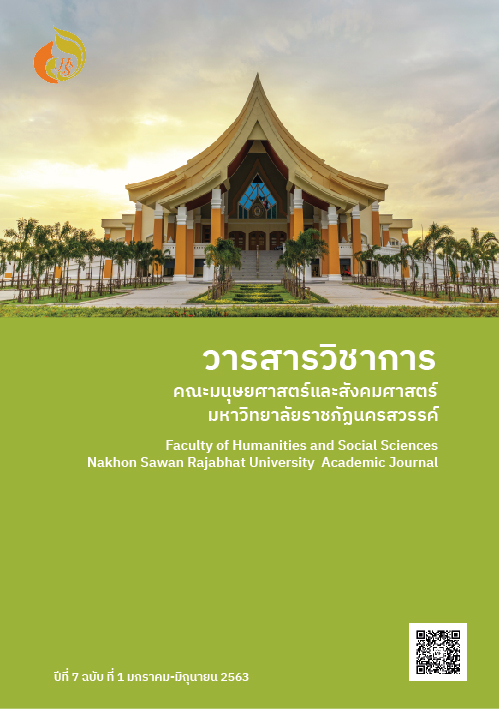แนวคิดในการศึกษาประวัติศาสตร์จักรวรรดิโรมันในโลกวิชาการตะวันตก
Main Article Content
บทคัดย่อ
บทความนี้มุ่งศึกษามุมมองของนักวิชาการในโลกตะวันตกที่ศึกษาเกี่ยวกับแนวคิดเรื่องจักรวรรดิและการล่มสลายของจักรวรรดิโรมัน ซึ่งมีมุมมองความคิดต่อจักรวรรดิโรมันแตกต่างกันไปในประเด็นเรื่องการล่มสลายของจักรวรรดิโรมัน สามารถแบ่งแนวคิดของนักประวัติศาสตร์ที่ศึกษาจักรวรรดิโรมันได้เป็น 2 กลุ่ม ได้แก่ 1) กลุ่มที่มองว่าจักรวรรดิโรมันเกิดการเสื่อมและล่มสลาย ซึ่งบรรดานักประวัติศาสตร์ในกลุ่มนี้ยังมีความเห็นต่างกันเรื่องปัจจัยที่ส่งผลให้จักรวรรดิล่มสลาย และ 2) กลุ่มที่มองว่าจักรวรรดิโรมันไม่ได้ล่มสลาย แต่มีการเปลี่ยนผ่านและสืบเนื่อง ในบทความนี้พิจารณาข้อถกเถียงระหว่างนักประวัติศาสตร์ทั้งสองกลุ่มโดยอาศัยแนวทางประวัติศาสตร์นิพนธ์เป็นกรอบคิดในการวิเคราะห์ ผลการศึกษาพบว่ามุมมองของนักวิชาการที่มีต่อจักรวรรดิโรมันซึ่งมีความแตกต่างกันในแต่ละช่วงเวลานั้นมีความสอดคล้องกับบริบทรอบตัวนักประวัติศาสตร์ผู้ศึกษา โดยเฉพาะอย่างยิ่งบริบทของวงวิชาการสังคมศาสตร์ที่มีต่อคำว่า “จักรวรรดิ” ซึ่งส่งผลต่อการอธิบายประวัติศาสตร์จักรวรรดิโรมัน
Article Details
เอกสารอ้างอิง
Bankston, C. L. (1993). Ratting Gibbon’s Cage. Commonwealth. pp. 28–29.
Bowersock, G. W. (1996). The Vanishing of the Fall of Rome. Bulletin of the American Academy of Arts and Sciences, (49), pp. 29–43.
Bowersock, G. W. (1998). Gibbon’s Historical Imagination. The American Scholar, 57, pp. 33–47.
Brown, P. (1974). Mohammed and Charlemagne review. Daedalus, 103, pp. 25–33.
Gillett, A. (2017). The Fall of Rome and the Retreat of European Multiculturalism: A Historical Trope as a Discourse of Authority in Public Debate. Cogent Arts & Humanities, 4, pp. 1-13.
Harrison, T. (2009). Introduction: New Vision of Ancient Empires. In The Great Empires of the Ancient World (pp. 6–17). Los Angeles: J. Paul Getty Museum.
Hubbard, G., & Kane, T. (2013). Balance: The Economics of Great Powers from Ancient Rome to Modern America. New York: Simon & Schuster.
Krause, C. (2011). Historiographical Survey of the Decline of the Roman Empire. Retrieved from http://portfolio.krauselabs.net/evidence/12-4.pdf
Lieven, D. (2002). Empire: A Word and Its Meanings. In Empire: The Russian Empire and Its Rivals (pp. 3–26). New Haven: Yale University Press.
Queenan, S. (n.d.). An Era of Decline, Change, and Transformation The End of the Ancient World and the Beginning of the Middle Ages; An Analysis of Previously Established Historical Interpretations. Retrieved from https://www.academia.edu/3475045/_2nd_Year_An_Era_of_Decline_Change_and_Transformation_The_End_of_the_Ancient_World_and_the_Beginning_of_the_Middle_Ages_An_Analysis_of_Previously_Established_Historical_Interpretations
Ward-Perkins, B. (2005). Did Rome ever Fall? In The Fall of Rome and the End of Civilization (pp. 1–10). Oxford: Oxford University Press.
Whitehouse, R. H. and D. (1983). Mahammed, Chalemagne and Pirenne. In Mohammed, Charlemagne, and the Origins of Europe: The Pirenne Thesis in the Light of Archaeology (pp. 1–19). Ithaca: Cornell University Press.


